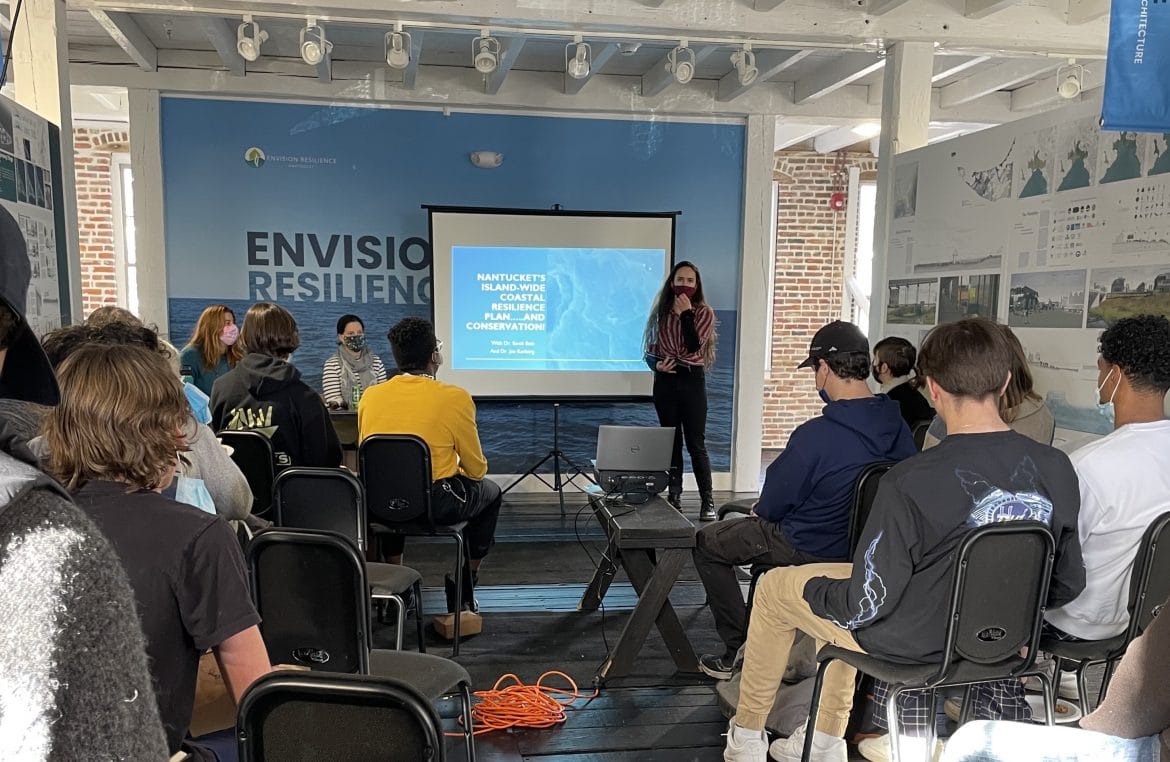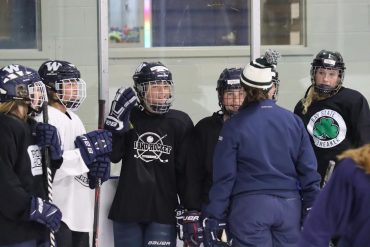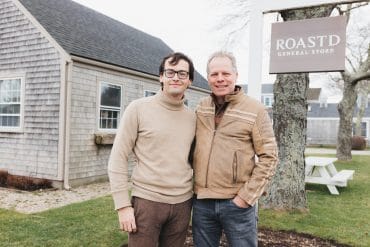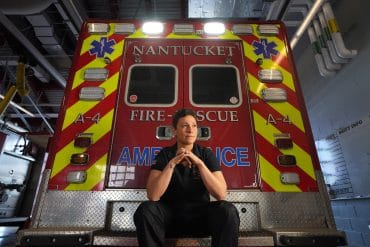Anna Popnikolova is a sophomore at Nantucket High School and a talented writer for the student newspaper Veritas who regularly contributes to Nantucket Current. In today’s post, Popnikolova reports on the recent Climate Cafe event that included Nantucket High School students.
A group of Nantucket community members and students gathered on Wednesday at the Thomas Macy Warehouse for the “Climate, Coffee, and Conversation” event organized by the Nantucket Youth Climate Committee.
Led by president Sarah Swenson and vice president, Ellie Kinsella, both juniors at Nantucket High School, students spent months planning the event — with the help of Envision Resilience and Sam Kefferstan, a member of Mass Audubon. The NYCC began meeting in-person as the 2021-2022 school year began, and have been working with Kefferstan on several projects — one of which was the climate walkout staged at NHS earlier in the school year, and weekly trash cleanups with the Nantucket Clean Team.
“Working with the NYCC as part of Mass Audubon’s Youth Climate Leadership Program is one of the most fulfilling aspects of my role in serving as Nantucket Sanctuaries Director,” Kefferstan said. “It is really exciting to see that the group has grown six-fold from four to 25 students from its inception in 2020, and that they have captured public attention to raise awareness about the Nantucket Coastal Resilience Plan. To see this momentum in action is really inspiring, and gives me hope that the next generation is engaged in the work necessary to prepare for the challenging future ahead.”
Those involved with making the climate cafe possible consider the event to have been a resounding success, with participation at almost twice the expected number of attendees. Swenson explained that, “Before the event, we had to guess how many people would show up, for catering and space reasons; and we guessed about 30 people; the actual number was close to 50.” With the space sectioned out for the event, the upper floor of the Thomas Macy warehouse, guests had to spread out across the area and students sat cross-legged in the wings, or stood in the back of the room to accommodate the amount of viewers.
The event was geared more toward a younger audience, seeking to educate and involve the future population.
“I was especially happy about the student turnout. It took some incentives from Ms. Erisman — small extra credit rewards— to get students there, but I honestly don’t think how they got there is important, the end result is the same: they showed up and listened.” Swenson remarked.
The NYCC has been setting their focus on education with most of their projects so far — specifically, making sure that the younger generation of Nantucket community members knows about current climate events taking place on island. “The young people are the most important to reach, in my opinion. I know that they can’t vote and they aren’t the ones making the decisions for the town or the construction companies and such, but they’re the ones who will be in those positions in 20, 30 years,” the NYCC president said.
The committee invited speakers Dr. Sarah Bois, from the Linda Loring Nature Foundation and Dr. Jennifer Karberg, from the Nantucket Conservation Foundation to give an educational presentation on the Coastal Resilience Plan which has been in the the works for several years now and has recently been undergoing Select Board review. Dr. Bois and Dr. Karberg outlined multiple of the most prominent points of the proposal and opened up to the audience for questions and discussion.
Dr. Bois said, “I was inspired by the number of students at the event. It gives me so much hope for the future of our community that our youth are not only listening, but involved and questioning. This is their future (short and long-term) that we are planning for.” The event and committee operated with a strong focus on the future, and what it may hold for the younger residents of Nantucket Island.
The students had some discussion questions prepared, which they engaged Bois and Karberg with after the presentation was over, talking about student and community involvement, as well as next steps for the plan. A large part of the work the NYCC has been doing focused around the CRP has been trying to condense the plan down to more manageable pieces. With the plan coming in at around 300 pages, students found the plan difficult to digest and thus more complicated to explain and discuss.
“Since it is such a long plan, we think that having smaller reach outs and meetings to explain what is actually going to happen and things being done will help out immensely with community support for the resiliency plan,” explained Kipper Buccino, a junior at NHS and secretary of the NYCC.
Dr. Karberg outlined the next steps that the island needs to take, and that organizations across island are working on: “for the Select Board to accept the Coastal Resilience Plan in January and begin prioritizing planning for the short term solutions in the CRP. Finding funding through state and federal grants will be important but also finding ways to connect to different neighborhoods and groups on island to talk about what solutions look like, how they are important and what people can do on their own to improve resilience.”
Reaching out and getting the community involved have been important for the Nantucket Youth Climate Committee and for other organizations like Envision Resilience, the Conservation Foundation, and Linda Loring — those who partnered with the NYCC to set up the cafe.
“A big problem with getting the message out is that people just don’t know about it.” Buccino shared, “By making it more digestible, we hope to gain community support and take action with the town and the people of the CRP.” he continued. The committee is continuing to set up cleanup dates once a week with the Nantucket Clean Team, and will be organizing another Climate, Coffee and Conversation event to take place in the spring. The main goal for organizations across island is to make sure everyone is involved, and knows that their voice is important — and to make sure all community members have the resources and means to understand current climate resiliency efforts.
Dr. Bois expressed her opinion that, “As a community, we need everyone involved in some way. What is important to you? Attend meetings, make your voice heard, and communicate with each other about priorities. It can’t be “business as usual”. We need to be innovative, take action, and work together.”
With high hopes for the future of the Nantucket Climate Committee and their plans for island outreach, Swenson said, “I hope the NYCC gets the chance to continue hosting events like this in the future, and connecting to and informing more people. This is a strong start to what I think will be an educational year for all involved.”





